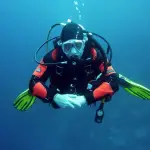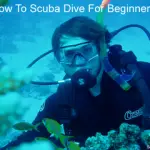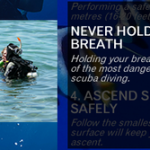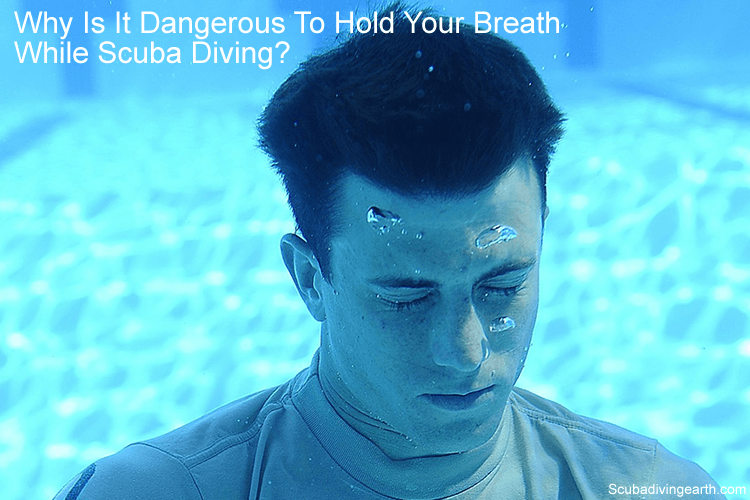
Why is it dangerous to hold your breath while scuba diving?
There are a number of safety lessons in scuba diving. One of those lessons includes how it’s important it’s vital to not hold your breath. The strike-through on the word important is deliberate. It’s to highlight how serious breath holding can be. In your scuba diving lessons you’ll also learn about Boyle’s Law and how this relates to scuba diving.
It’s dangerous to hold your breath while scuba diving because if you do, you risk a lung over expansion. A lung over expansion can lead to a pneumothorax (collapsed lung) or an arterial gas embolism (which can lead to a stroke). You’ll learn in your diver training the most important rule in scuba diving is to not hold your breath. You’ll learn about Boyle’s law, where the air in a diver’s lungs expands during ascent and contracts during descent. Breath holding underwater can result in one of the above two serious injuries and even death.
The best way to do more diving is to book yourself on a scuba diving liveaboard. You can check the latest and best deals on liveaboards using the following window:
How does Boyle’s law relate to scuba?
Before I explain further about ‘why is it dangerous to hold your breath while scuba diving,’ I first need to explain Boyle’s Law and how it relates to scuba diving.
Boyle’s law is a gas law.
It’s one of the fundamentals of scuba diving safety training. Where Boyle’s Law describes how the pressure of a gas tends to increase as the volume of the container decreases. In this example and for the purposes of this article, the container is your lungs.
Boyle’s Law states that the pressure and volume of a gas have an inverse relationship, when temperature is held constant. If volume increases, then pressure decreases and vice versa, when temperature is held constant.
Another way to define Boyle’s Law: It’s the absolute pressure exerted by a given mass of a gas which is inversely proportional to the volume it occupies if the temperature and amount of gas remain unchanged within a closed system.
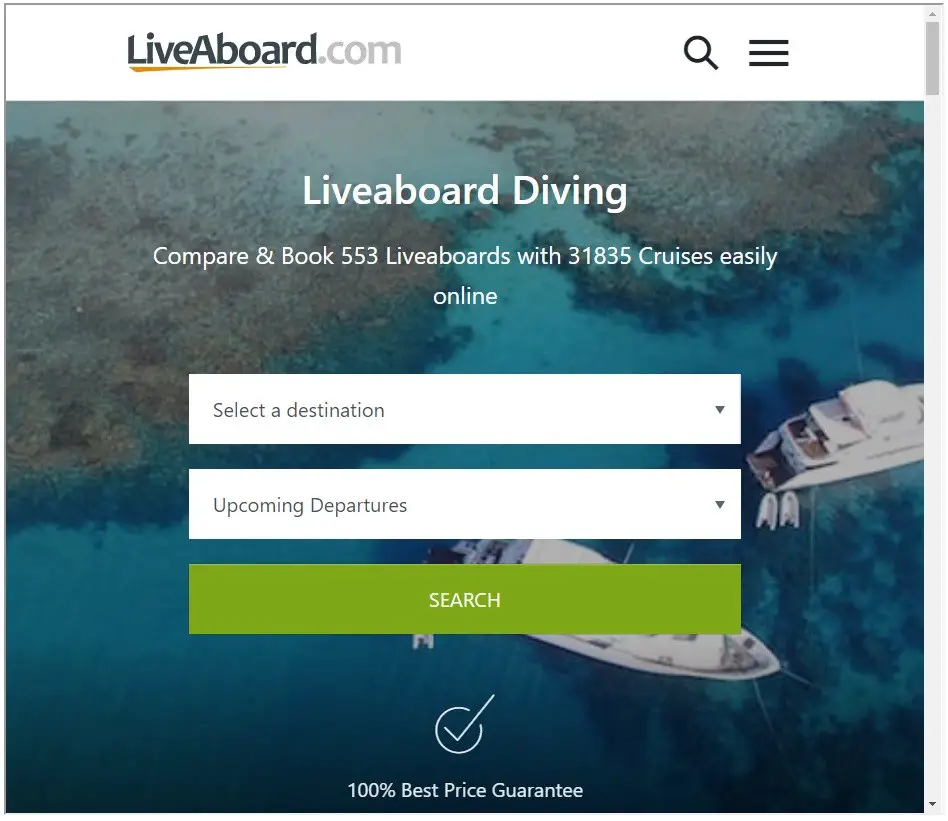
Why do scuba divers not hold their breath?
Holding your breath when scuba diving can lead to your lungs over expanding. This can lead to an alveolar rupture, which in the worst case scenario can lead to death. So never hold your breath when scuba diving.
The last two words in the last paragraph of the previous section above ‘closed system‘ are important to understand.
When you hold your breath, your lungs effectively form a close system, where air cannot enter nor escape your lungs.
As you ascend from your dive, the pressure of the water around you decreases. That means that any compressed gases (which includes the air in your lungs as air is gas) will also expand.
If you are breathing normally, your airway is open and the expanding air on your ascent to the surface is allowed to escape.
But if you’re holding your breath, your airway is closed and the expanding air cannot escape.
This is the most important rule to understand in scuba diving. Which is at the point of lung over expansion, something has to give. That something to give is your alveoli, which can rupture. But it’s the consequences of that rupture you need to be concerned about. More about this in the next section.
Why is it dangerous to hold your breath while scuba diving?
Arterial gas embolisms as a complication of a pulmonary barotrauma result in around 30% of all recreational diving fatalities.
Many ask the question: ‘why is it dangerous to hold your breath while scuba diving?’
If you hold your breath during your ascent, your lungs will over expand and an alveolar rupture will occur. An alveolar rupture can lead to a pneumothorax, which is air in the pleural space (which is the space around your lungs) and can lead to a collapsed lung.
Alternatively an alveolar rupture can lead to an arterial gas embolism.
Both of these outcomes from holding your breath are serious. Both can result in your death, which is why this is the number one rule for safe diving taught to beginner scuba divers.
Whilst drowning is reported to be the most common cause of death among scuba divers, arterial gas embolisms as a complication of pulmonary barotraumas rank second.
In fact arterial gas embolisms account for around 30% of all recreational diving fatalities.
An alveolar rupture leading to a pneumothorax
The first possible result from a lung over expansion can be a pneumothorax.
This can cause the following problems or symptoms for a scuba diver:
- Dyspnea – Difficult or labored breathing or shortness of breath.
- Pleuritic chest pain which may radiate to the shoulders, arms, back, neck and jaw.
- A unilateral decrease in breath sounds.
- Pneumomediastinum – A sensation of a tight or heavy chest or a fullness in the chest.
- Coughing, hoarseness, and dysphagia (Swallowing problems).
An alveolar rupture leading to an arterial gas embolism
An alveolar rupture can allow air into the pulmonary venous circulation, which can lead to a subsequent arterial gas embolism.
An air or gas embolism is a bubble that becomes trapped in a blood vessels and blocks it.
In addition to a lung over expansion from breath-holding when diving, an arterial gas embolism can also be caused from nitrogen bubbles forming in the blood vessels as a result of decompression sickness or “the bends“.
Symptoms of an air or gas embolism after diving can include:
- Joint or muscle pain.
- Low blood pressure, which may cause dizziness, slurred speech and confussion.
- Chest pain.
- A blue tinge to the skin, which is called cyanosis.
- An irregular heartbeat or worse still a heart attack.
- Breathlessness and fast breathing.
- Blurred vision.
- Itchy skin.
- Bloody froth from the mouth.
- Paralysis or weakness, possibly of one or more limbs.
- Fits or a stroke.
- Loss of consciousness.
Some of these symptoms or conditions are extremely serious. In some cases they can be fatal, which is particularly the case if the air embolism isn’t treated quickly.
The symptoms don’t always happen immediately. Sometimes they can develop after about ten to 20 minute after surfacing from your dive. It’s extremely important not to ignore these symptoms.
You must seek immediate medical help.
No automatic system to warn of an alveolar rupture
There’s no automatic system in your body to force you to exhale when your lungs reach breaking point.
It’s not like the breath reflex or the dive reflex, which is where the submersion of the face in water triggers a response, which results in the shutting down of the airways against the influx of water.
The first you’ll know about an alveolar rupture is from the pain of the rupture or a lung barotrauma (pulmonary barotrauma). At this point it may be too late and unless you seek urgent medical attention you could be in serious trouble.
Breath-holding isn’t just when you ascend from a dive
Not holding your breath isn’t only about when you’re ascending from your dive. It’s also important that you don’t hold your breath during the dive too.
During a dive your depth may change on a regular basis. You may need to ascend slightly to navigate over a raised sea bed or a coral formation.
When you change depth, the pressure of the water changes and so does the pressure of the air in your lungs. If you were to be holding your breath at the point when you reduce your depth, this could result in an alveolar rupture too.
So you must always breath normally through-out the whole dive.
How to avoid a lung barotrauma or a gas embolism
The easiest way to avoid a lung barotrauma is to never hold your breath and to breath normally and continuously.
In addition to never holding your breath, you should also follow these safe diving practices too:
- Limit the depth of your dives. The deeper you dive the higher the risks.
- Limit the duration of your dives, especially the deeper you go and avoid decompression stop diving.
- Always come to the surface slowly and always perform a safety stop.
- Always use a dive computer or dive tables to maintain a safe ascent rate from your dive.
- Always have a safe dive interval between dives, don’t dive again until you’ve spent a suitable amount of time at the surface.
- Never dive with a cold or a chest infection.
- Make sure you’re well hydrated before diving and always drink plenty of water.
- Never fly within 24 hours after diving. This would include not going to high altitude after a dive.
Can your lungs explode scuba diving?
Some ask whether your lungs can explode when you’re scuba diving. Yes technically they can, but it’s not really an explosion in the true sense of exploding lungs. A ‘lung-explosion,’ is more of a rupture, as explained above. Which as already explained can happen if you hold your breath during a dive.
A ‘lung explosion’ is more likely to happen on your ascent. This is also more likely to happen if you ascend too quickly, especially if you’re also holding your breath.
An alveolar rupture is as a result of an over-expansion of your lungs, which is like an explosion, and should be avoided at all costs.
So never ever hold your breath when you’re scuba diving. Which is the most important rule in scuba diving?
More Reading: What should you not do after scuba diving (11 must NOT do’s after diving)
Video showing why you should not hold your breath underwater scuba diving
50ft Below explains why you should not hold your breath underwater using a balloon. But also compares scuba diving to snorkeling, when it’s okay to hold your breath and why you can.
In this video we will show you why you should never hold your breath while scuba diving. Lesson number one in your scuba diving course is to never hold your breath. And in this video we are going to show you what happens if you do hold your breath while scuba diving!
I hope you enjoyed this article about why is it dangerous to hold your breath while scuba diving
I’d love to hear from you. Tell us about your adventures of diving and snorkeling, in the comments below. Please also share your photos. Either from your underwater cameras or videos from your waterproof Gopro’s!
If this article hasn’t answered all of your questions. If you have more questions either about snorkeling or scuba diving (or specifically about why is it dangerous to hold your breath while scuba diving), please comment below with your questions.
There will also be many more articles about scuba diving (and snorkeling) for you to read and learn about these fabulous sports.
Have fun and be safe!


